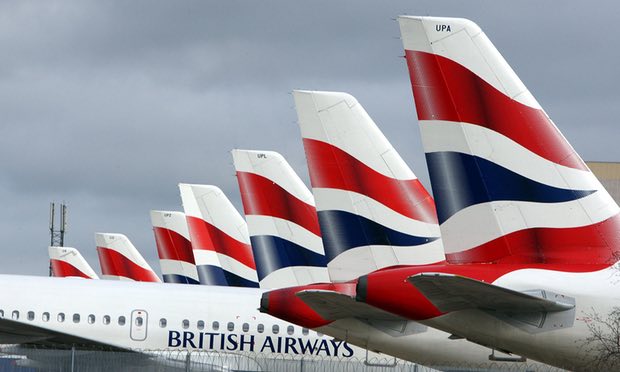
Cabin crew at British Airways have announced they will hold a four-day strike later this month, compounding the problems for the beleaguered airline which stranded 75,000 passengers at the weekend after an IT meltdown.
Unite members of the mixed fleet, set up in 2011 on inferior pay and conditions, will walk out from 16 June in a dispute over “poverty pay” at the airline. A proposed deal was reached in May, but one which included sanctions against crew who had been on strike and deprived low-paid staff of travel perks.
BA has said during previous strikes that it ensured all passengers reached their destination, through merging flights and hiring other carriers to operate planes on their behalf. The strike is unlikely to cause anything near the disruption of the power outage that saw the airline cancel over 800 flights at the start of the bank holiday weekend.
The airline is continuing to investigate the cause, with reports suggesting a maintenance worker had inadvertently switched off the power supply. But CBRE, the contractor which manages the facilities at BA’s ageing Boadicea House data centre near Heathrow, said claims that the cause had been determined were “not founded in fact”.
CBRE, a global firm whose services include maintaining mechanical and electrical services for data centres, said: “We are the manager of the facility for our client BA and fully support its investigation. No determination has been made yet regarding the cause of this incident. Any speculation to the contrary is not founded in fact.”
BA said its investigation was ongoing and the cause had not been determined.
In an internal email to staff, Bill Francis, the head of IT for BA’s parent company, IAG, said an uninterruptible power supply to a core data centre at Heathrow was over-ridden.
He said: “This resulted in the total immediate loss of power to the facility, bypassing the backup generators and batteries … After a few minutes of this shutdown of power, it was turned back on in an unplanned and uncontrolled fashion, which created physical damage to the system, and significantly exacerbated the problem.”
Francis told investors in 2015 that he would find savings of about €90m (£78m) per year from outsourcing IT operations, which followed the cuts in pay and conditions for BA’s cabin crew he had overseen in 2011.
The GMB union said IT outsourcing had contributed to the failure, and demanded to take part in an external inquiry. Mick Rix, GMB national officer for aviation, said the union wanted to “ensure that the information and views from our skilled IT members on the front line is properly put forward, and taken on board by BA IAG.”
He added: “It is counter-intuitive to think that sending vital IT and other business functions thousands of miles will not affect the resilience of the BA IAG operation.”
Many IT roles are now outsourced to Tata Consulting Services. However, a TCS spokesperson said: “As BA has already confirmed, the problems were caused by a power supply issue and were in no way related to TCS. While TCS was not responsible for this issue, our staff have worked alongside BA and their partners to restore services as quickly as possible.”
The power shutdown knocked out the airline’s computer systems, but experts have questioned why any company would not have a functioning uninterruptible power supply and failsafe backups.
BA had to cancel all flights from London’s Heathrow and Gatwick airports last Saturday, leaving 75,000 passengers stranded. It blamed a power surge that knocked out its computer system, disrupting flight operations, call centres and its website.
Willie Walsh, the chief executive of IAG, on Thursday praised BA bosses for “doing everything possible” after the IT meltdown.
Walsh’s comments came amid reports that the BA board is demanding an external inquiry into the fiasco, which is expected to land the airline with a £100m-plus compensation bill.
He said the investigation would take time but insisted that BA’s management, led by chief executive, Alex Cruz, “did everything they could in the circumstances”.
The airline has been criticised for not promising full compensation to all those affected, but Walsh said: “Our focus will be on making sure that any of our customers who experienced disruption are satisfied with how we handled things. Clearly we will do everything we can to make up for the disruption that they suffered.”
Customers have been further angered by BA’s online claim forms, which instruct them to first seek compensation via their travel insurance – leaving many liable to pay an excess. The Association of British Insurers has complained to the airline that it is giving misleading information and that BA should be the first point of call.
BA said it now had amended its website.
The level of compensation the airline intends to provide will be of intense interest to customers who are still waiting for their bags to be returned, even though they were unable to fly.
END

Be the first to comment